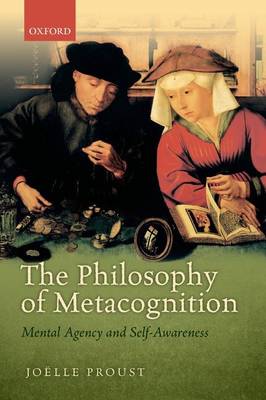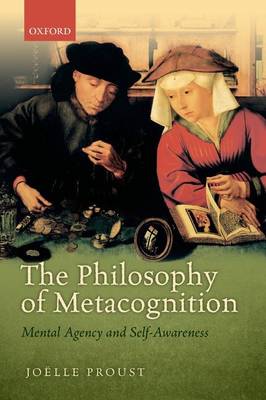
- Afhalen na 1 uur in een winkel met voorraad
- Gratis thuislevering in België vanaf € 30
- Ruim aanbod met 7 miljoen producten
- Afhalen na 1 uur in een winkel met voorraad
- Gratis thuislevering in België vanaf € 30
- Ruim aanbod met 7 miljoen producten
Zoeken
€ 58,45
+ 116 punten
Omschrijving
Does metacognition, i.e. the capacity to form epistemic self-evaluations about one's current cognitive performance, derive from a mindreading capacity, or does it rely, at least in part, on sui generis informational processes? In The Philosophy of Metacognition Joëlle Proust provides a powerful defense of the second position. Drawing on discussions of empirical evidence from comparative, developmental, and experimental psychology, as well as from neuroscience, and on conceptual analyses, she purports to show that, in contrast with analytic metacognition, procedural metacognition does not need to involve metarepresentations. Procedural metacognition seems to be available to some non-humans (some primates and rodents). Proust further claims that metacognition is essentially related to mental agency, i.e. cognitive control and monitoring. "Self-probing" is equivalent to a self-addressed question about the feasibility of a mental action ('Am I able to remember this word?').
"Post-evaluating" is a way of asking oneself whether a given mental action has been successfully completed "'Is this word the one I was looking for?"). Neither question need be articulated conceptually for a feeling of knowing or of being right to be generated, or to drive epistemic control. Various issues raised by the contrast of a procedural, experience-based metacognition, with an analytic, concept-based metacognition are explored, such as whether each is expressed in a different representational format, their sensitivity to different epistemic norms, and the existence of a variety of types of epistemic acceptance.
"Post-evaluating" is a way of asking oneself whether a given mental action has been successfully completed "'Is this word the one I was looking for?"). Neither question need be articulated conceptually for a feeling of knowing or of being right to be generated, or to drive epistemic control. Various issues raised by the contrast of a procedural, experience-based metacognition, with an analytic, concept-based metacognition are explored, such as whether each is expressed in a different representational format, their sensitivity to different epistemic norms, and the existence of a variety of types of epistemic acceptance.
Specificaties
Betrokkenen
- Auteur(s):
- Uitgeverij:
Inhoud
- Aantal bladzijden:
- 384
- Taal:
- Engels
Eigenschappen
- Productcode (EAN):
- 9780198748175
- Verschijningsdatum:
- 30/01/2016
- Uitvoering:
- Paperback
- Formaat:
- Trade paperback (VS)
- Afmetingen:
- 229 mm x 155 mm
- Gewicht:
- 589 g

Alleen bij Standaard Boekhandel
+ 116 punten op je klantenkaart van Standaard Boekhandel
Beoordelingen
We publiceren alleen reviews die voldoen aan de voorwaarden voor reviews. Bekijk onze voorwaarden voor reviews.











